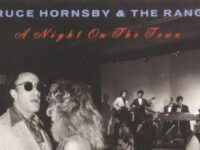When rock and pop stars make a foray into jazz it can risky proposition for them. While I’m sure all of them do it out of some sincere love for the music form, they can’t expect to sell as many records as they’re accustomed to – and if they don’t have the chops to pull it off, they wind up looking silly for trying it.
Over the years, however, we’ve seen some of these guys managed to not embarrass themselves. Carlos Santana called in members of Miles Davis’ Second Quintet and made an underrated fusion album in 1980. Steve Miller did a competent blues-jazz record back in ’88 with Born 2B Blue. Randy Bachman has showed off his Wes Montgomery chops on out-of-character releases.
And then there’s Bruce Hornsby. One of the rare rock pianists who emerged in the ’80s, assembling mid-tempo folk-based tunes with which he combined tasty chops and an Appalachian timbre in his voice, with hits like “The Way It Is” and “The Valley Road.” So what happened to that guy, anyway? Turns out, Hornsby has had much more in his arsenal than churning out pleasant little heartland-style pop ditties like “Mandolin Rain.”
In 1993, he stretched out with the varied Harbor Nights, bringing in everyone from Pat Metheny and Branford Marsalis to Phil Collins and Jerry Garcia. Since that record, he’s gone in many different directions – even changing his singing voice – while always hinting at an affinity for jazz and improvisation. Camp Meeting, released on Aug. 7, 2007, was where he finally went headlong in that direction.
Unlike the other examples I mentioned, Bruce Hornsby neither dilutes his jazz with other influences nor plays it so congenially that it bores the listener after a few listens. There’s a playfully, funky undercurrent in the whole proceedings; not the hard rocking of the Bad Plus, but more like a snappy jaunt. Hornsby’s piano style is percussive, although gentler compared to, say, McCoy Tyner. He swings mightily and is highly nuanced for a “rock ‘n’ roll” guy. Hornsby himself calls it “Bill Evans-meets-the-hymnbook.” And just in case you’re wondering, he left the voice mic at home; this was all instrumental.
Hornsby’s earnestness is underscored by the guys he hired to round out his trio: Christian McBride (acoustic bass) and Jack DeJohnette (drums). In fact, Camp Meeting was officially credited to all three, but it’s clear this is Hornsby’s project from the production credit, the contribution of originals and the generally relaxed style.
The pianist brings a devil-may-care attitude to his first full-on foray into jazz and the album is all the more interesting because of it. I mean, it takes some balls for a major pop star to cover Ornette Coleman, but to start off the record that way? You gotta love a guy like that. Hornsby shows off a convincing proficiency in the art of harmolodics, even when there’s no recording of “Questions and Answers” by Coleman himself to compare against.
The other jazz covers Hornsby tackles are all much better known, although he avoids giving these tunes run-of-the-mill treatments. For instance, check how McBride’s bass follows Hornsby’s main melodic line of Thelonius Monk’s “Straight, No Chaser,” only at certain notes.
The Miles Davis tune “Solar,” which was a favorite cover for Bill Evans, starts out with lyrical lines much like Evans’, but as that all-world rhythm section enters the picture, it becomes a funky little riff, with DeJohentte and McBride adding little accents here and there to propel Hornsby further along. John Coltrane’s “Giant Steps” begins with the odd inclusion of a sampled hip-hop rhythm but as the bop workout commences, it become apparent that this fits in like a glove. And DeJohnette seems to be having fun playing around it at fade-out time.
Bud Powell’s “Un Poco Loco” (which segues into Bruce Hornsby’s own “Chant Song”), is one cover that doesn’t deviate all that much from the original, but the festive, Latin-tinged composition still fits Hornsby’s playing style well. Keith Jarrett’s “Death and the Flower” is one of only two ballads from Camp Meeting. It’s kind of appropriate that Hornsby picks a Jarrett tune, given his debt to Keith’s playing style (not to mention that he borrowed Jarrett’s drummer for these sessions). Hornsby’s approach is introspective as the song’s composer would have it, if not as quite as masterful. “We’ll Be Together Again,” is another soft number, rendered much the same way.
The originals here sit alongside these well-chosen covers quite nicely. The title cut is a delightful vamp on which Bruce Hornsby casually rides over DeJohnette’s creole shuffle without once succumbing to the temptation to hot-dog it. McBride states the theme in the upper register while Bruce covers it down low. “Charlie, Woody and You” combines a solidly blues-based bass line with dissonant piano chords that somehow stays tethered to the simple chord progression.
In the end, so Bruce Hornsby won’t ever be mentioned alongside his influences in the realm of jazz piano. Still, he proved on Camp Meeting that he was plenty good enough to hang with the big dogs, and laid down a set of tracks that maintained some originality while being a whole lot of fun.
The tall guy who once preferred a gig as a sideman for the Grateful Dead over placing hits in the Top 20 again opened his mind, while giving whatever of his original audience was still hanging around more food for open souls.
- James Brandon Lewis Quartet – ‘Abstraction Is Deliverance’ (2025) - May 27, 2025
- Soft Machine – ‘Drop’ (1971, 2025 remaster) - May 21, 2025
- Marshall Allen’s Ghost Horizons – ‘Live In Philadelphia’ (2025) - May 19, 2025



